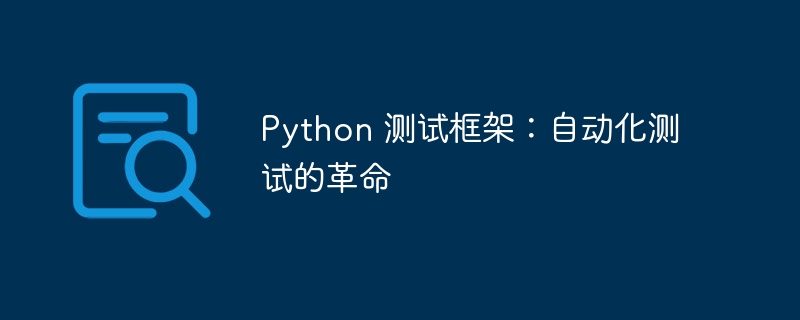

Assoftware developmentcontinues to increase in complexity,Automated testinghas become a critical step to ensure application quality and reliability.pythonis one of the preferred languages forautomatedtestingdue to its flexibility, scalability and extensive libraries. This article will take an in-depth look atPythonTestingFrameworksand learn how they have revolutionized the landscape of automated testing.
Python testing framework overview
The Python testing framework provides a set oftoolsand conventions that allowdevelopersto create, run, and maintain automated tests easily and efficiently. They provide functionality such as test case management, assertions, simulation, and reporting.
Main testing framework
Python has an extensive ecosystem of testing frameworks, including:
Innovation in automated testing
The Python testing framework has revolutionized automated testing by:
1. Improve efficiency:
The framework provides predefined test case templates, assertions and simulations, eliminating the duplication and tediousness of writing test code.
2. Enhance reliability:
The framework enforces coding standards and conventions to ensure maintainability and readability of test cases. Automated reporting capabilities help easily identify and diagnose test failures.
3. Promote code coverage:
The framework enables developers to automatically generate code coverage reports, identify uncovered code blocks and improve overall test coverage.
4. Support collaboration:
The Python testing framework can be integrated with continuous integration (CI) tools and version control systems to facilitate cross-team collaboration and test maintenance.
5. Scalability:
The framework has a modular design, allowing developers to extend and customize them according to specific needs. Third-party plug-ins and libraries provide additional functionality and flexibility.
Advantages of using Python testing framework
1. Easy to learn and use:
The Python testing framework provides intuitiveapiand clear documentation, making it easy for both beginners and experienced developers to get started.
2. Community support:
Python has an active community with rich documentation,tutorials, and examples to help overcome testing challenges.
3. Cross-platform compatibility:
Python and its testing framework can run on multiple platforms such aswindows,linuxandMacOS, ensuring the portability of test cases.
4. Enterprise-level support:
Leading testing frameworks such asselenium, Appium and Robot Framework all offer commercial support and services, ensuring a higher level of stability and usability.
5. Full stack testing capability:
The Python testing framework is not only suitable for unit testing, but also for integration testing, end-to-end testing and API testing, providing a full-stack testing strategy.
Best Practices
Follow best practices to get the most out of your Python testing framework:
in conclusion
The Python testing framework has revolutionized automated testing. They improve efficiency, reliability, code coverage, collaboration, and scalability. By embracing the power of Python testing frameworks, developers can create robust, maintainable automated test suites, ensure software quality and reliability, and accelerate software delivery pipelines.
The above is the detailed content of Python Testing Framework: The Revolution in Automated Testing. For more information, please follow other related articles on the PHP Chinese website!




